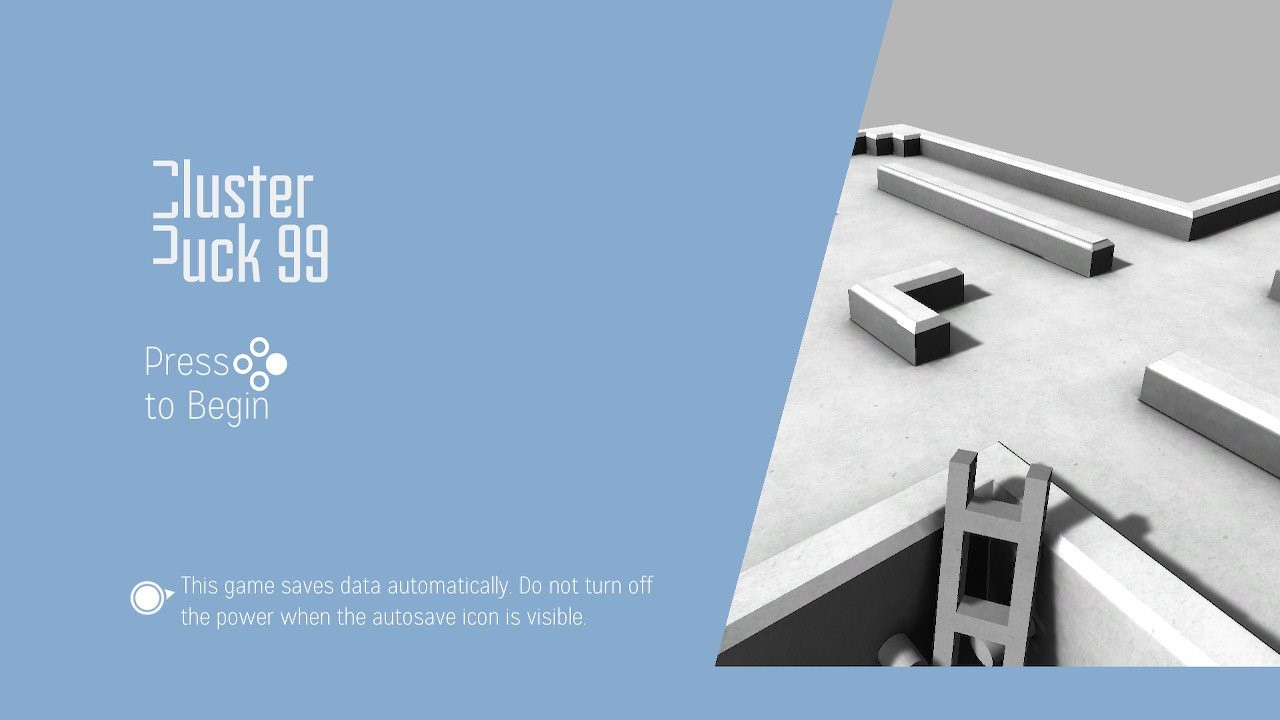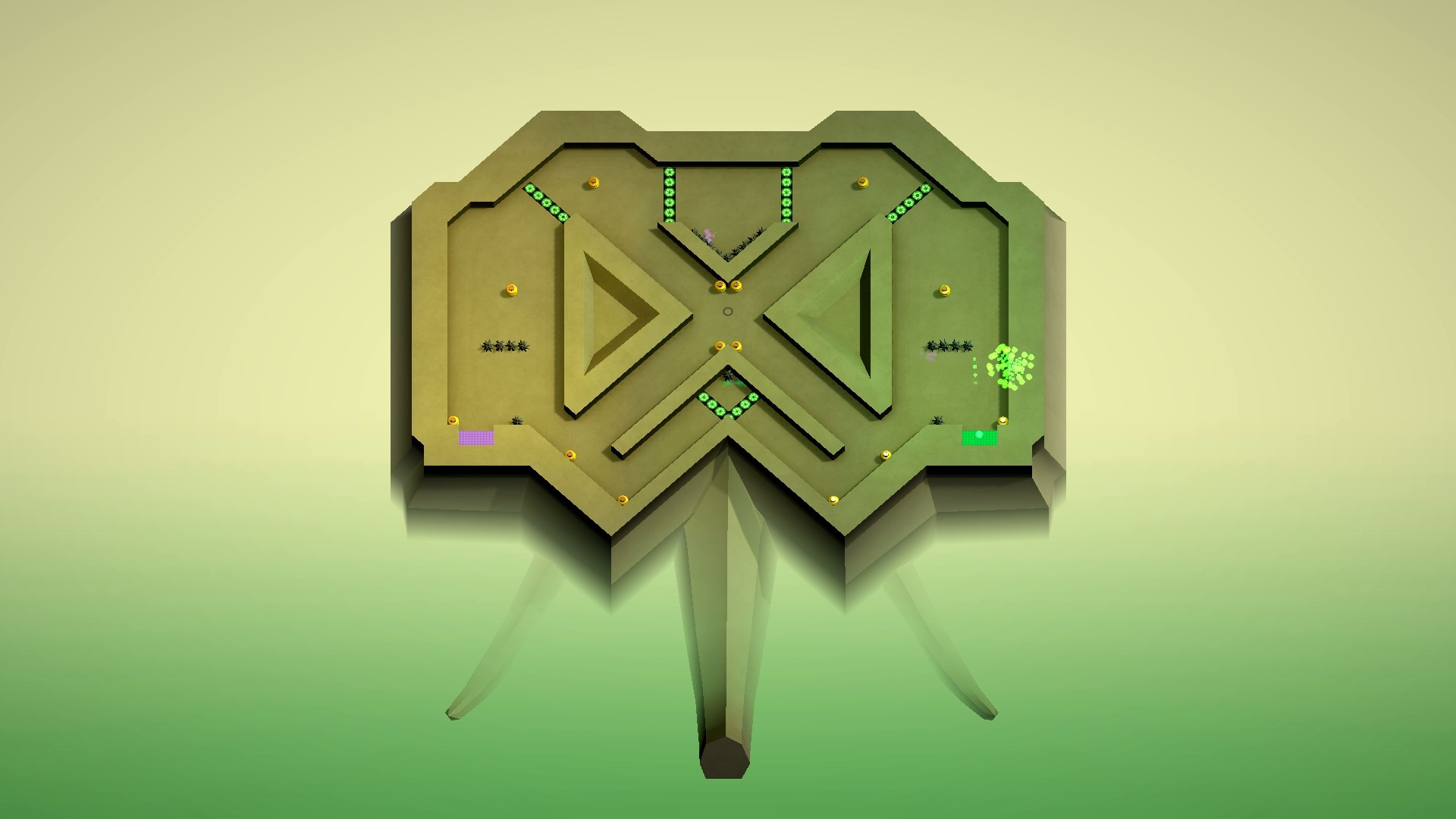Got 99 Problems, and They’re All ClusterPuck
If games were dollars, the Switch eShop would almost be able to pay the average American healthcare bill. Almost 900 games make up a huge selection, but a substantial chunk of them arguably aren’t worth their virtual shelf space. A few obscure games get some solid reviews, but the rest are best left for amateur bloggers who have free review codes. Because I, too, am an amateur web-person, I occasionally buy these no-name releases in the pursuit of the ultimate hipster cred: liking it before it was cool.
ClusterPuck 99 was one such purchase, and it’s pucking subpar. What a joke, right? It’s cheeky to use profanity as the root of a pun. It’s also shallow comedy which doesn’t stay very funny in the long run. ClusterPuck falls into the same rut. Its concept is quirky enough to be interesting, but without the proper programming to support it, the gameplay becomes more grating with each match. This is chaff at its finest, best forgotten amongst the clusterpuck of other crap on the eShop.

What is it?
ClusterPuck is essentially hockey but with fewer safety precautions and questionable physics. You’re a puck trying to score a smaller puck into the opponent’s goal. Be it 1v1 or 4v4, you must outscore your enemies in a set time or reach a certain score to grab the win. In addition to the opposing team, the arenas present several obstacles to theoretically amp the in-game chaos. Falling off the stage or colliding into spikes temporarily removes you from play while boost pads and bumpers help or hinder your movement.
The controls are about as straightforward as the rules. Gliding into the puck snatches it off the ground or dislodges it from an opponent’s grasp. When you control the puck, the right analogue stick aims, B/ZL allows for a charge shot, and A/ZR just flings it out there. Without the puck, your charge shot becomes a brake, and your normal shot now initiates a short dash. This dash can knock back opponents and dislodge the puck at the cost of a significant but temporary speed decrease.
When you grow tired of pucking friends or computers, you can go solo in the game’s Challenge Mode or delve into the Arena Creator. Of the ten missions offered in Challenge Mode, five involve beating a team of computers, and the other five task you with other menial jobs. Based on your performance, you’re awarded medals or new color options for your teams. If you’re more inventive than you are skilled, the level editor could possibly extend ClusterPuck’s longevity. However, take note: no matter how wonderfully you design your stage, you can still only play ClusterPuck on it.

What’s good?
- ClusterPuck’s strongest feature is its level design, and a solid arena can offer the opportunity for a fun match. It may sound awesome to have seven other people playing with you for local multiplayer, but friends don’t count for crap if the stage is awful. Bumpers, spikes, boost pads, and curved/few walls tend to make for good levels. Conversely, ClusterPuck’s self-proclaimed “Competitive” arenas put the “basic” in “basically garbage,” so much so that the creators themselves named a stage, “Boring.”
- The level editor is surprisingly fleshed out. Apart from some aesthetic components, you can create just about anything the developer could have made. That said, it can be a chore to change materials, and you can’t delete misplaced objects without erasing the floor as well.

An accurate recreation of Solomon at parties.
What’s bad?
- Beginning with the least egregious error, ClusterPuck looks and sounds dull. Rather than presenting any character, both the graphics and music seem like cookie-cutter assets bought from an online vendor. Aesthetic flair is sorely missed when trying to distinguish your puck from your teammates’. Your name and a simple symbol (like a pizza, a dot, or an ass) designate which puck is yours, but you’ll still lose track of yourself when the game’s namesake inevitably occurs.
- Roombas served as the main inspiration for ClusterPuck’s AI. The COMs follow a simple set of parameters. One will hang near the goal and orbit it based on the other team’s movements. The rest will rush the puck like a rabid crowd on Black Friday. If an enemy crosses their beeline to the puck, they dash. If the AI is against you, it can seize the puck from Death itself and guide it into your goal. If the AI is on your team, it will backstab you and score for the other side. This is how the robot uprising begins.
- Movement is slow and slippery. Your puck controls similarly to a hockey player, except that player is wearing grease-bottomed sneakers instead of skates. Because you’re limited to making wide turns, you’ll have very little ability to dodge or juke opponents. Because everyone moves at the same speed—regardless of whether you have the puck—players can have a clear shot at the goal if they get lucky and emerge from a dogpile unscathed. Braking could theoretically help with turning, but your acceleration is so lethargic, it’s best to ignore the function.
- ClusterPuck’s design choices fail to foster a solid competitive or casual multiplayer game. The game runs too slowly to ramp up any adrenaline, and the aforementioned floaty controls limit any skillful maneuvers. Passing and ricochet shots are so impractical that you’re better off just barreling the puck into the goal. Unreliable physics make dashing dangerous because a dash either sends an enemy flying or does absolutely nothing. Most matches devolve into everyone humping the puck until someone dislodges it and meanders over toward the goal. Whether I played with one other person or seven, ClusterPuck could not hold anyone’s interest for longer than a couple of games.

Contrary to what is written below, I did gain pleasure out of making this.
What’s the verdict?
Bad mechanics make for easier jokes, but I gain little pleasure in trashing ClusterPuck 99. No matter how severely I criticize the game, I imagine the developers attempted to produce the best experience they could offer. However, if this is the case, their best is currently not any better than another developer’s mediocre. ClusterPuck’s core concept could have made for a solid multiplayer experience, but its poor execution epitomizes the risk you take when buying obscure games from small-time studios. In this case, you’re better sticking with the mainstream successes.
Arbitrary Statistics:
- Score: 4.5
- Time Played: Over 4 hours
- Number of Players: 1-8
- Games Like It on Switch: Rocket Fist, Rocket League


